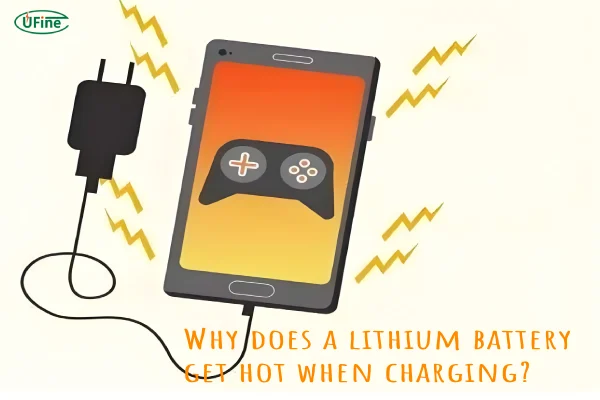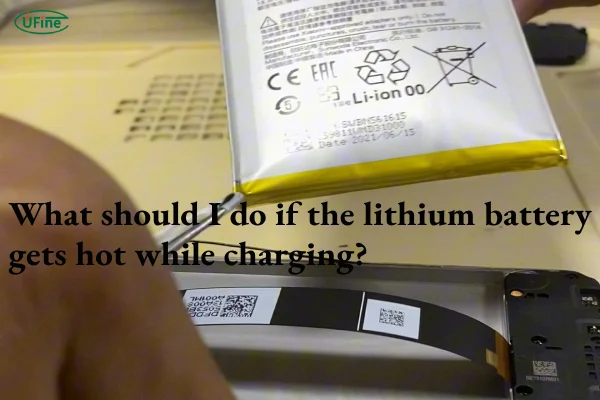
- Part 1. Why do lithium batteries get hot when charging?
- Part 2. Common scenarios: when batteries get hot
- Part 3. What happens if a lithium battery gets too hot?
- Part 4. What should I do if my battery gets hot when charging?
- Part 5. Technical solutions for battery manufacturers
- Part 6. Normal temperature range for charging lithium batteries
- Part 7. Does fast charging make batteries hot?
- Part 8. Everyday tips to prevent battery overheating
- Part 9. Summary
- Part 10. FAQs
It’s common to notice that your lithium battery feels warm when charging — whether it’s in a smartphone, laptop, electric bike, or energy storage system.
So, is it normal for batteries to get hot while charging?
Yes, a slight temperature rise is normal. During charging, electrical energy is converted into chemical energy, and a small amount of heat is released.
However, if your battery becomes very hot, gives off an odor, or even swells, it’s not normal and could signal a potential safety issue such as overcharging, internal short circuit, or poor charger quality.
In this guide, we will explain why batteries get hot when charging, whether it’s dangerous, and how to handle it safely.
Part 1. Why do lithium batteries get hot when charging?
Several internal and external factors can cause a lithium-ion battery to heat up during charging.
1. Internal Resistance Generates Heat
Every lithium battery has internal resistance. As electric current flows during charging, this resistance produces heat.
When lithium ions move between electrodes, the higher the resistance, the more heat is generated.
In short: higher current or poor cell consistency = more heat buildup.
2. Chemical Reactions Inside the Battery
Charging triggers oxidation and reduction reactions inside the battery. These reactions naturally release heat. Under fast charging or high ambient temperature, reaction speed increases, leading to more pronounced heating.
3. Poor Heat Dissipation
If the heat generated can’t escape — for example, when charging your phone under a pillow, or when EV batteries are packed tightly — temperature will rise continuously.
4. External Environment
High ambient temperature or poor ventilation also raises the risk. Charging under direct sunlight, or inside a hot car, can make the battery dangerously hot.
5. Charger-Related Factors
A faulty or mismatched charger is one of the most common causes of overheating.
- Using a non-original or poor-quality charger may provide unstable voltage or excessive current.
- A damaged charging cable can also lead to abnormal resistance and heat generation.
Ufine Tip: If your charger or adapter also feels unusually hot, stop charging immediately and check both the charger and the battery pack.
Part 2. Common scenarios: when batteries get hot
Different devices experience heating for different reasons.
| Device Type | Typical Cause of Heating | How to Handle |
|---|---|---|
| Smartphone | Fast charging, heavy app use during charge, poor ventilation | Avoid gaming or watching videos while charging; use certified chargers |
| Laptop | High workload while charging (CPU + battery heat), blocked vents | Keep laptop on a hard surface; ensure fan ventilation |
| Electric bike / EV | High charge current or fast charging in hot weather | Avoid charging immediately after riding; use manufacturer-approved charger |
| Power bank / Energy storage system | Simultaneous charging & discharging; poor airflow | Charge in a cool, dry place; don’t cover the unit |
Part 3. What happens if a lithium battery gets too hot?
Excessive heat is not just uncomfortable — it can affect performance, lifespan, and safety.
1. Performance Degradation
Heat accelerates electrolyte breakdown and structural changes in electrodes, reducing battery capacity and energy density.
2. Shorter Lifespan
Frequent high-temperature charging speeds up battery aging, resulting in reduced cycle life.
3. Safety Hazards
Overheating may cause thermal runaway, leading to swelling, leakage, or even fire.
Although modern lithium batteries are much safer than older designs, consistent overheating is always a warning sign.
Part 4. What should I do if my battery gets hot when charging?
If you feel your battery heating up, follow these steps immediately:
- Unplug the charger and allow the device to cool naturally.
- Check the charger and cable for damage or poor contact.
- Avoid using the device while charging.
- Charge in a ventilated environment (avoid closed boxes or soft surfaces).
- Monitor battery behavior — swelling or smell = stop use and inspect.
Never place a hot battery in a refrigerator or cold water. Sudden temperature shifts can cause condensation and internal short circuits.
Part 5. Technical solutions for battery manufacturers
At Ufine Battery, we take multiple engineering approaches to reduce heat during charging and ensure stable performance:
- Optimized internal design to minimize internal resistance.
- Advanced materials with high thermal stability (electrodes, electrolytes).
- Smart BMS (Battery Management System) for real-time temperature and current control.
- Improved cooling structures in high-capacity or high-rate battery packs.
These innovations ensure that even under fast charging or extreme conditions, Ufine lithium batteries maintain safety and efficiency.
Learn more about our high-safety lithium battery packs designed with optimized thermal performance
Contact Us NowPart 6. Normal temperature range for charging lithium batteries
The safe operating temperature range for most lithium batteries is -20°C to 60°C, but the ideal charging range is 0°C to 40°C.
| Temperature | Behavior | Recommendation |
|---|---|---|
| Below 0°C | Ions move slowly, charging efficiency drops | Warm the battery to room temperature |
| 0°C–40°C | Ideal charging condition | Safe and optimal |
| Above 45°C | Risk of swelling or electrolyte breakdown | Stop charging and inspect |
Ufine’s LiFePO4 and lithium polymer batteries are specially designed for stable performance across wide temperature ranges.
Part 7. Does fast charging make batteries hot?
Yes. Fast charging technologies — such as PD (Power Delivery) or Qualcomm Quick Charge — increase voltage and current to shorten charging time.
This process generates additional heat inside both the battery and the charger.
Even though modern devices include temperature management circuits, it’s still common for batteries and chargers to feel noticeably warm.
Part 8. Everyday tips to prevent battery overheating
Simple habits can make a big difference in keeping your battery healthy:
- Charge in a cool, ventilated place.
- Avoid using devices during charging.
- Don’t cover the charger or battery.
- Use original or certified chargers and cables.
- Unplug once fully charged.
- Avoid leaving devices in cars under sunlight.
- For EVs or e-bikes, charge after the battery has cooled down post-use.
Bonus Tip: Check both your charger and battery pack periodically. A healthy charger ensures stable voltage and reduces the risk of overheating.
Part 9. Summary
A slight temperature rise during charging is perfectly normal, but if your lithium battery or charger becomes very hot, that’s a warning sign.
It may indicate poor heat dissipation, charger mismatch, or an aging battery.
By using certified chargers, charging under proper conditions, and monitoring temperature, users can ensure longer battery life and safety.
At Ufine Battery, we focus on high-safety lithium battery packs with optimized thermal performance and smart protection systems — perfect for phones, laptops, EVs, and energy storage applications.
Part 10. FAQs
How hot is too hot for a lithium battery?
If a battery exceeds 120°F (49°C) during charging, it’s too hot and could be dangerous.
Can overheating damage my battery?
Yes. Persistent high temperatures can shorten lifespan and even cause leakage or swelling.
Is it safe to use a battery that gets very hot when charging?
No. Stop using and inspect both the charger and the battery immediately.
Can I use fast charging safely?
Yes, if the battery and charger are designed for it. Ufine’s custom battery packs can safely handle fast charging with controlled thermal performance.
Can I cool a hot battery quickly?
Let it cool naturally in a shaded area. Never put it in a refrigerator or expose it to cold water.
Related Tags:
More Articles

Battery Load Test: A Comprehensive Guide
Step-by-step battery load test guide for car, solar & industrial use. Learn how to load test a battery, interpret voltage charts, and avoid common mistakes.
The Comprehensive Guide to Battery Balancing and Battery Balancer
Discover how battery balancers improve lithium battery performance, lifespan, and safety. Learn types, functions, and tips to choose the right balancer.
What Is the Best Voltage for a Chainsaw Battery?
Compare 12V-80V chainsaw batteries for light pruning, medium firewood, and professional cutting. See best battery chainsaw with runtime charts and safety tips.
Lithium VS. Alkaline Batteries: A Comprehensive Comparison
Lithium batteries last 3–7× longer than alkaline and perform better in cold weather. Compare lifespan, cost, safety, and best uses to choose the right battery.
Comparing Lithium-Sulfur and Lithium-Ion Batteries: Which is Right for You?
Compare lithium-sulfur (Li-S) and lithium-ion batteries on energy, lifespan, cost, safety, and applications. Best choice for drones, EVs, and electronics.




